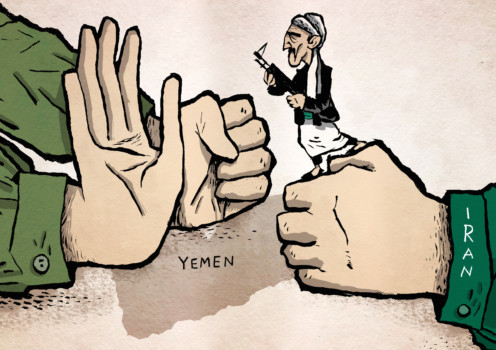
Iran has got to stop its adventurist policy in the region or be ready to face the consequences. This is the message the coalition of nine Arab countries is trying to send across to the leadership of the Islamic Republic of Iran with their military action in Yemen.
Saudi Arabia and other Gulf Cooperation Council states are not normally known, politically or militarily, for their belligerent policy, but the air attacks launched last Thursday by their forces against the Iranian-supported Al Houthi rebels in Yemen indicates that there is a limit to their restraint, too. For at least six months now, Arabs have been, by and large, resisting the option of full-scale war with Iran directly or indirectly for the sake of the region’s peace and security. Therefore, the newly formed coalition of Saudi Arabia and eight Arab allies, besides Pakistan, is not only a formidable force to counterbalance the dangerously expanding influence of Iran in an already unstable region, but it also marks action on an unprecedented scale in the region since the first Gulf War to liberate Kuwait in 1991.
The Saudi-led coalition of Egypt, the UAE, Kuwait, Qatar, Jordan, Sudan and Morocco was formed after negotiations with the Al Houthis to reach an amicable settlement on all national and local differences in Yemen, including the Al Houthis’ rights as a large minority group in the country, failed miserably. As a result, a civil war in Yemen became a distinct possibility a few months ago with several different groups pushing the country towards the edge. It became amply clear that the primary driver in this campaign was the Al Houthi rebels trying to exploit the situation given the increasingly diminishing forces loyal to the country’s President Abd Rabbo Mansour Hadi.
The Al Houthis make for a well-established Zaidi militia group in the northern part of Yemen extensively supported by Iran and with the local backing of the remainder of the Yemeni military, apparently still led and fed by the former president, Ali Abdullah Saleh. The Al Houthis’ takeover of the capital Sana’a last February forced Hadi to flee to the south and re-establish his presidential office in Aden.
Last resort
The Saudi-led coalition has taken shape after a long and painful wait. Many believe the military action in Yemen by the coalition has come probably far too late and should have been initiated as far back as last September, or at least January when the Al Houthis effectively took over Sana’a. But the Saudi ambassador to Washington, Adel Al Jubeir, explained the delay in taking action when he said that the use of force “was a last resort”.
The decision was also taken “with a great deal of reluctance” after the Iran-backed Al Houthi leadership and their allies repeatedly rejected several attempts at mediation for a political solution. President Hadi’s repeated offers to be part of a unity government and readiness to jointly run the country with the Al Houthis were rejected time and again even as the rebels continued their dalliance with former president Saleh in orchestrating a devious transitional military coup.
The Al Houthis, also known by the name Ansarullah, have stoked tensions in the country through their actions since the middle of 2014. They not only forced the legally elected government of Hadi to resign in January, but also pushed through their own draft constitution, took control of all security forces, halted the democratic transition process and confronted Yemenis with a ‘take it-or-leave it’ political option. They also hunted down activists and journalists including Nobel laureate Tawakul Karman. This only added to the chaotic situation prevailing in the country over the last 6-8 months as the security forces split their loyalties between Hadi, the Al Houthis and Saleh.
While President Hadi is widely supported in the south of the country by militia known as the Popular Resistance Committees and the local tribes, both Hadi and the Al Houthis are openly opposed by Al Qaida in the Arabian Peninsula (Aqap), which has been engaged in terrorist attacks against targets in the south and south-east of the country.
To complicate the situation further, a Yemeni group affiliated to Daesh (self-proclaimed Islamic State of Iraq and the Levant) emerged in late 2014 and has been competing with Aqap for dominance. The latter group carried out a series of suicide bombings in the capital earlier this month.
Political forces
Meanwhile, the Al Houthis have been openly calling on their opponents to yield to their demands — the message being play with us or you are eliminated. They have alienated almost all political forces in the country, including the tribes, also threatening Western and Arab interests. The picture became so surreal that the Al Houthis, having cemented their ties with Tehran and taken control of large parts of the country stretching from north to the gates of Aden, found themselves playing right into the hands of both Aqap and Daesh.
With the open support of the US, UK and Europe for Operation Storm of Resolve, the Saudi-led military action puts the GCC in another defining moment in its history since the Gulf war of 1990-1991. Let us hope they are up to the challenge of protecting Arabian shores from Iranian agendas.
Mustapha Karkouti is a former president of the Foreign Press Association, London.










